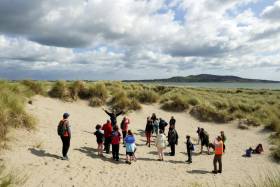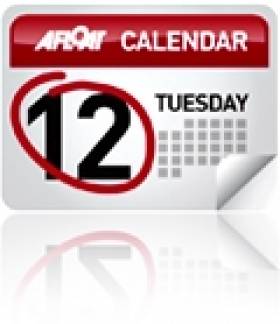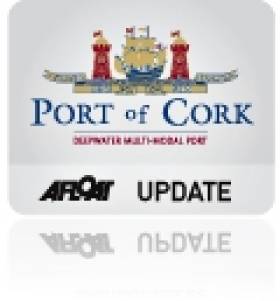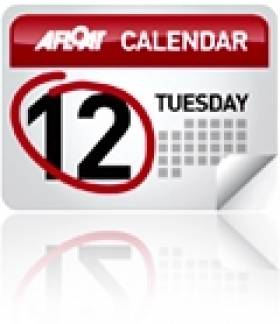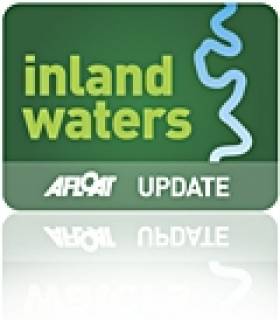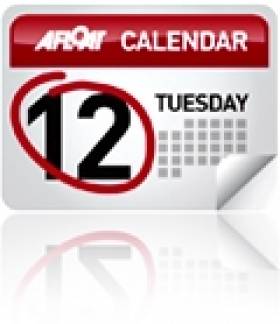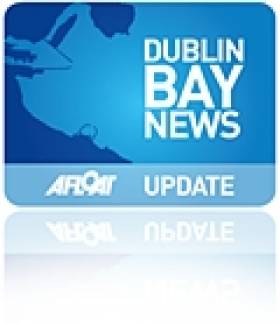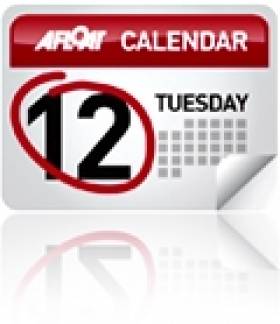Displaying items by tag: National Heritage Week
In celebration of National Heritage Week 2021, the Marine Institute has launched a new Interactive Marine Archive where you can explore two rare historical collections on Irish sea and inland fisheries.
The digitised collections include the Sea and Inland Fisheries reports from 1839-1987, which show what fish were being taken from our seas, where they were landed and their values at market annually, among other revealing tidbits.
Also available is the Scientific Investigations collection which spans from 1901-1926 and contains papers and journal articles of new scientific discoveries of that time, such as how Maude Delap closed the life cycle of the jellyfish and the deep-sea documentations of Anne Massey.
“These reports contain valuable data about the pre-exploitation state of Irish fisheries,” said Stephanie Ronan, librarian at the Marine Institute. “Digitising these historical books and extracting key information enables these data to be visualised and explored, making them easily and widely accessible to researchers and the public today.”
Dr Maurice Clarke, marine ecosystems lead at the Marine Institute, added: “It is only in examining the past, and beginning our journey of discovery with the appropriate baseline data, that we can offer advice on the impacts of climate change and fishing to government.
“For example, the work done a hundred years ago on the herring fisheries in Ireland — which yielded tens of thousands of tonnes annually, while today the yields are in the mere hundreds of tonnes — shows the impacts that climatic changes had even then.”
An interactive timeline takes you through 150 years of Irish fisheries history and the highlights for each year from the Sea and Inland Fisheries reports and Scientific Investigations series.
The Habitat Map displays the location of oyster beds licenses granted in 1875 throughout Ireland. Select a location and find out where the license was granted, to whom, when and the area of the beds in acres, roods and perches. The archive also includes annual landing data for species such as cod, haddock and salmon.
You can explore the work and achievements of many of the key scientists in Ireland, from Ernest Holt, George Farran and Arthur Went to the Marine Institute’s John Molloy.
And find out more about the vessels that have supported Irish fisheries research throughout the years, from the Helga — a 150ft steam liner used in 1901 — to the Marine Institute’s modern RV Celtic Explorer and RV Celtic Voyager which are used by scientists today.
The Interactive Marine Archive project was funded under the European Maritime Fisheries Fund Marine Biodiversity Scheme.
National Heritage Week (18-26 August) Also Takes to the Seas
#HeritageWeek - Its that time of year again as National Heritage Week (18-26 August) begins tomorrow. Numerous events on land will be held across the country in addition to those of a nautical theme and directly taking place at sea.
Most of the week's events involving local communitiy organisations are free while others may require booking involving a fee. The programme highlights the abundance of great work that is carried out in all communities in Ireland to preserve and promote our natural, built and cultural heritage.
National Heritage Week is part of European Heritage Days. This is a joint initiative of the Council of Europe and the European Union in which over forty countries participate each year.
Afloat has picked a handful of events associated with the sea, for further information click the accompanying links. As for all other events covering a broad range of interests click What's On in addition to twitter and facebook.
Coastal & Island Heritage Cruise (18 - 26 August: 10:30am - 12:30pm) BOOKING REQUIRED Saoire Mara Charters, Kincasslagh Pier, Co. Donegal. For details click HERE
Dalkey Town and Coastal Walk (22 August: 7pm - 8pm) Anna Scudds, Dun Laoghaire Borough Historical Society, Dalkey Church, Car Park Co. Dublin, Dún Laoghaire-Rathdown. Click HERE
Launch of a Restored Foyle Ferry (25 August: 1pm - 5pm) Moville Men's Shed, Moville Pier, Co. Donegal. For details click HERE
Experience Wild Atlantic Waves (26 August: 5pm - 9pm) Achill Yawl Heritage Day, Achill Sound, Co. Mayo. For details click HERE
In addition Afloat highlights an Irish Naval Service 'Open Ship' event held in Cork City Quays as part of Cork Heritage Week. This one-day naval event takes place tomorrow, Saturday, 18 August, when LÉ Orla will be open to the public for guided tours along the South Jetties.
Crew members of the Coastal Patrol Vessel (CPV) will present the tours between 10:00-12:30 and 14:00-17:00. Should there be updates, please consult the INS facebook HERE.
National Heritage Week: Lecture Series 'The War to End All Wars'
#heritageweek- National Heritage Week which is in fact 9 days long, is at this stage nearing its half-way stage, yet there are still days left to discover and enjoy our heritage.
The annual event is co-ordinated by The Heritage Council and its aim is to build awareness and education about our heritage thereby encouraging its conservation and preservation.
Among the events previously posted on Afloat.ie is a reminder of the Maritime Institute of Ireland's (MII) lecture series titled 'The War to End All Wars'. This is to be held in the Eblana Club, Dun Laoghaire this Sunday 31 August, the final day of the Heritage Week.
The lecture series will feature 8 speakers throughout the day and accompanied by discussions, debates, music and song.
Among the lectures is 'Excusive New Material on the Mailboat Leinster Sinking' presented by Roy Stokes. This lecture includes a unique playing of an interview with Jim Sweeney, Second Purser on RMS Leinster.
Later that day a lecture 'With Regard to RMS Lusitania' by David Snook will no doubt provide much interest too.
The first lecture is 12 am and continues to 8 pm at the venue on Elana Avenue located off Marine Road. Registration begins as at 11.30 so make sure you book early as places are limited.
Programme details (in PDF format to download) are found on the M.I.I. website HERE. In addition this website provides further details of their National Maritime Museum of Ireland which is located nearby to the Eblana Club.
For ALL events held throughout the country and further details during National Heritage Week visit: www.heritageweek.ie
Heritage Day 2013: Port of Cork HQ Tours & 'Seascapes'
#HeritageDay – Heritage Day 2013 is next Saturday 17 August and marks the start of National Heritage Week which runs to the 25 August.
As part of the Heritage Day, there will be an illustrated talk by RTE Radio 1 Seascapes presenter/ producer Marcus Connaughton.
The talk will be about the maritime heritage of our seafarers and maritime explorers who sailed the World's Oceans. "Maritime Heroes of An Island Nation- featuring Edward Bransfield; Tom Crean; Admirals Barry and Brown; John Philip Holland; Shackleton and many others."
This FREE event will commence at 2pm in the Port of Cork Boardroom, should you wish to attend, bookings can be made by contacting Sara Mackeown on (021) 462 5375.
On the same day the Port of Cork's Custom House Building will be open to the public between 11am – 4pm. Note, there is no parking available.
National Heritage Week: Maritime Lecture Programme
#MARINE HERITAGE – Up and down the country, events are been held for the annual National Heritage Week including a series of maritime lectures as previously reported on Afloat.ie
Below is a full detailed description of the varied topics of the lecture programme which is to be held in the Dun Laoghaire Club, Eblana Avenue (off Marine Road) on the final day (Sunday 26th August) of the heritage week.
12 noon The 'Kowloon Bridge' and her sisters – by Garda Diver Peter Brady.
1.15 pm A West of Ireland view of the Battle of the Atlantic – by Dr. Michael Kennedy, Royal Irish Academy.
3.00 pm Early navigation in Ireland / maritime archaeology of Sligo harbour and bay.- by Auriel Robinson DAHG.
4.15 pm Captain Bligh and Dublin Bay- speaker, Terry Cummins of the Irish Naval Association.
6.00 pm The greatest naval catastrophe in England's history-concealed throughout history by Elizabethan propaganda historiography.
This lecture is to be presented by special guest speaker; Dr. Luis Gorrochategui Santos – who is visiting Ireland especially for the heritage week lectures organised by the Maritime Institute of Ireland (M.I.I.) which runs the National Maritime Museum of Ireland.
For further information about the day's lecture contact Barney Yourell on 087 9007466
Admission is free, noting there is a recommended donation of €10
Fun for the Kids: Peg People-Create Your Own Character!
#PEG PEOPLE - This weekend's (18-19 August) children's arts and craft morning workshop is as usual been held in the Waterways Visitor Centre located in Dublin's Grand Canal Dock. Noting the centre has also organised other events and activities as part of National Heritage Week and with the Tallships (23-26 August) coming to town!
The theme of the creative morning is 'Peg People-Create Your Own Character With Textiles and a Wooden Peg! The activity is part of an on-going Children's Summer Workshop Programme, held every weekend until late August. On each of the weekends (both mornings), the theme of the art & craft workshop will change.
Art & craft workshops are to cater for two age groups with the first workshop (5-7 year olds) starts at 11:00 and the second session for those (aged 8-10) begins at 12 noon.
Admission is €3.00 per child, all children must be accompanied by an adult. Places are limited so booking is advisable. For further details contact: (01) 6777510, Wed-Sun 10.00am- 6.00pm and by visiting www.waterwaysirelandvisitorcentre.org/events.aspx
National Heritage Week Features Maritime Lectures
#MARITIME LECTURES – Next weekend sees the annual National Heritage Week (18-26 August) take place. As part of the week-long event, the Maritime Institute of Ireland is organising a programme of maritime themed lectures on the final day (Sunday 26th).
The line-up of five lectures is timed between 12 noon and the final lecture is scheduled at 6pm. The wide-ranging topics and speakers of the lecture programme will be held at the Dun Laoghaire Club, 3 Eblana Avenue, off Marine Road, noting the nearby landmark of the St. Michaels Church spire.
There is an entrance free and a recommended donation €10. For further information contact Barney Yourell 087-9007466 and www.mariner.ie/maritime-lectures-national-heritage-week-2012
For information on the rest of the diverse programme during the heritage week visit www.heritageweek.ie
Heritage Week: Maritime Lectures In Dun Laoghaire
12.30 – 1.30 pm. Neutral Ireland's Role in the Sinking of the Bismarck, May, 1941 By Dr. Michael Kennedy, Executive Editor, Documents on Irish Foreign Policy, Royal Irish Academy.
1.30 – 2.30 pm. Traditional Boats of Ireland. - Wooden workboats from all the Maritime Counties of Ireland. By Darina Tully, Lecturer and Maritime Archaeologist.
2.30 – 3.30 pm. Too Many Bags in the Lifeboat. A Lifeboat Tragedy at Bray 1876 By James Scannell, Lecturer and P.R.O of the Old Dublin Society.
4.00 – 5.00 pm. Maritime Guinness, The Ships, Yachts and Barges of the Guinness Dynasty. By Dr. Edward Bourke, Diver, Maritime Historian and Author of "Guinness, the Family, the Business and the Black Stuff"
5.00 – 6.00 pm. Ireland's Armada Heritage. The Story of the Spanish Armada of 1588. The discoveries of the wrecks on the Irish Coast and the recovery of artifacts. By Cormac Lowth, Lecturer, Author and Diver.
Further information Barney Yourell 087 900 7466 No seminar charge – donations accepted. Information in general on the Maritime Institute of Ireland can be found on http://www.mariner.ieand for other nationwide events of the Heritage Week visit www.heritageweek.ie
- Events
- Dun Laoghaire Harbour
- M.I.I.
- Dun Laoghaire Harbour News
- Event news
- National Heritage Week
- Heritage Week
- Maritime Lecture Seminar
- Spanish Armada
- Eblana Centre Dun Laoghaire
- Maritime Insitute of Ireland
- Bismarck
- Traditional Irish wooden boats
- Guiness ships
- Guinness barges
- Darina Tully
- Irish heritage boats
Heritage Week: Maritime Lecture Seminar Day
Below is listing of the lecture programme and times.
12.30 – 1.30 pm. Neutral Ireland's Role in the Sinking of the Bismark, May, 1941. By Dr. Michael Kennedy, Executive Editor, Documents on Irish Foreign Policy, Royal Irish Academy.
1.30 – 2.30 pm. Traditional Boats of Ireland. - Wooden workboats from all the Maritime Counties of Ireland. By Darina Tully, Lecturer and Maritime Archaeologist.
2.30 – 3.30 pm. Too Many Bags in the Lifeboat. A Lifeboat Tragedy at Bray 1876. By James Scannell, Lecturer and P.R.O of the Old Dublin Society.
3.30 – 4.00pm. Model Boats, A short talk to accompany the exhibition. By Garry Mooney secretary of the Irish Model Boat Club.
4.00 – 5.00 pm. Maritime Guinness, The Ships, Yachts and Barges of the Guinness Dynasty. By Dr. Edward Bourke, Diver, Maritime Historian and Author of "Guinness, the Family, the Business and the Black Stuff"
5.00 – 6.00 pm. Ireland's Armada Heritage. The Story of the Spanish Armada of 1588.The discoveries of the wrecks on the Irish Coast and the recovery of artifacts. By Cormac Lowth, Lecturer, Author and Diver.
For further information contact Barney Yourell Mob: 087 900 7466 No seminar charge – donations accepted
Information in general on the Maritime Institute of Ireland can be found on www.mariner.ie and for all the other events held during the National Heritage Week go to www.heritageweek.ie/
- Dublin Bay News
- Maritime Institute of Ireland
- Irish Model Boat Club
- Dun Laoghaire Club
- Dun Laoghaire Harbour
- M.I.I.
- Dun Laoghaire News
- RNLI Lifeboats
- National Heritage Week
- Heritage Week
- Maritime Lecture Seminar
- Sinking of the Bismark
- Traditional Wooden Irish Boats
- Guinness Ships
- Model Boats
- Ireland's Armada Heritage
- Spanish Armada
- Dun Laoghaire Maritime Museum


























